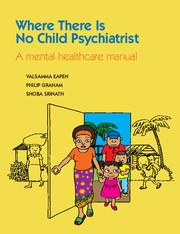Book contents
- Frontmatter
- Contents
- Preface
- Acknowledgements
- Abbreviations
- List of tables and boxes
- 1 Introduction
- 2 Assessment and treatment: general principles
- 3 Making a summary and action plan
- 4 Development and developmental problems
- 5 Intellectual disability
- 6 Habit disorders
- 7 Emotional problems
- 8 Behaviour and related problems
- 9 Specific problems in adolescence
- 10 Alcohol and drug dependency
- 11 Psychotic disorders
- 12 Chronic physical illness and disability
- 13 Physical illness without an identifiable physical explanation
- 14 Stressful situations
- 15 Parents and the needs of children
- 16 Mental health promotion
- 17 Medication
- References and suggested reading
- Appendix 1 My star chart
- Appendix 2 Guide to medication for use in childhood mental disorders
- Index
2 - Assessment and treatment: general principles
Published online by Cambridge University Press: 29 April 2024
- Frontmatter
- Contents
- Preface
- Acknowledgements
- Abbreviations
- List of tables and boxes
- 1 Introduction
- 2 Assessment and treatment: general principles
- 3 Making a summary and action plan
- 4 Development and developmental problems
- 5 Intellectual disability
- 6 Habit disorders
- 7 Emotional problems
- 8 Behaviour and related problems
- 9 Specific problems in adolescence
- 10 Alcohol and drug dependency
- 11 Psychotic disorders
- 12 Chronic physical illness and disability
- 13 Physical illness without an identifiable physical explanation
- 14 Stressful situations
- 15 Parents and the needs of children
- 16 Mental health promotion
- 17 Medication
- References and suggested reading
- Appendix 1 My star chart
- Appendix 2 Guide to medication for use in childhood mental disorders
- Index
Summary
Assessment
When carrying out an assessment, try to make the room in which you will see children as child-friendly as possible. The room may well be used to see adult patients as well, but if possible make sure that there is a chair that a younger child can feel comfortable sitting on. Try to make pencils and paper available. It is also helpful to have about three jigsaws for children of different ages. These are really useful for assessing the developmental age of a child. It is also helpful to have available about three children's books set at different levels. This will make it possible for you to do a rough check on a child's reading age.
You will not have a great deal of time to make an assessment, but assessing a child for a mental health problem will not be all that time-consuming if you know the right questions to ask (see below). Further, if you spend time at the beginning finding out about a mental health or development problem, you may save time later on. Children who have physical symptoms not due to physical illness may take up a great deal of time until you sort out what their problems are really about.
First, ask the mother an opening question, such as ‘What is the problem?’ Often you will have a good idea of the nature of the problem if you allow her to talk for as long as she wishes. Allow the mother to tell her story without interruption.
Do not miss the opportunity the assessment provides for observing the child and seeing his reaction to what the mother is saying. If he is more than 2 or 3 years old, try to bring him into the conversation. Observe the quality of the relationship between the child and his mother. For example, is she worried about talking in front of him if she is describing difficult behaviour or is she pleased to be able to tell you what a terrible boy he is? If you have been able to provide pencils and paper, take an interest in what he has drawn and praise him even if you think it is not at the level the child should be performing at at his age.
- Type
- Chapter
- Information
- Where There Is No Child PsychiatristA Mental Healthcare Manual, pp. 4 - 8Publisher: Royal College of PsychiatristsPrint publication year: 2012
- Creative Commons
- This content is Open Access and distributed under the terms of the Creative Commons Attribution licence CC-BY-NC-ND 4.0 https://creativecommons.org/cclicenses/



